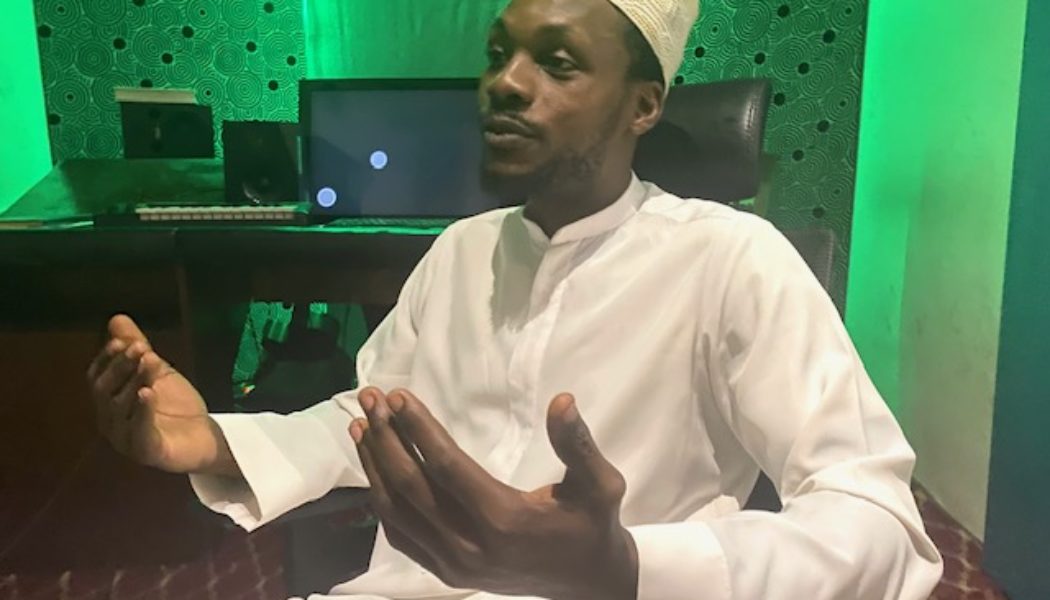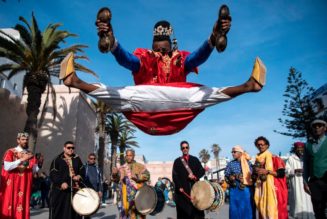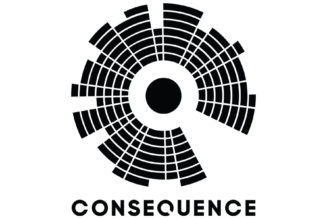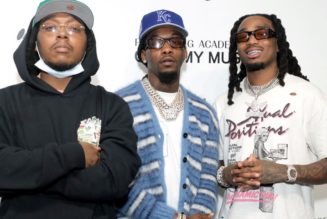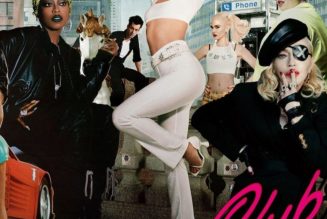BRAIN, AN ARTIST WITH STONE TOWN RECORDS; ZENJI BOI, OWNER OF STONE TOWN RECORDS; A STONE TOWN RECORDS CUSTOMER. (PHOTO BY LAMONT JONES JR.)
by Anthony Todd Carlisle and LaMont Jones Jr.
For New Pittsburgh Courier
“The future of Hip-Hop and rap music, whether people like it or not, is Africa—all 54 nations. It ain’t nothing new. People like, ‘Oh, man, they spitting over in Africa now.’ No, they ain’t new, you new.”
– Chuck D of Public Enemy on “Sway in the Morning,” Jan. 26, 2023
STONE TOWN, ZANZIBAR—In a nondescript rowhouse on a narrow side street in this bustling heart of Zanzibar, past rows of shoes and up a darkened staircase, Zenji Boi sits in front of a computer screen in his dim recording studio, dropping beats and advice for a young artist rapping into a microphone. The Hip-Hop rhythms emanating from other rooms in Stone Town Records don’t distract the record label’s founder, a practicing Muslim just back from his Friday noon prayers and still wearing a white robe.
A COURIER SPECIAL REPORT
A few minutes away, Rico Single is all b-boy bravado as his Hip-Hop tracks boom, song after song, inside his intimate Island Records studio. Black baseball cap pulled down over his eyes, blue bandana draped around his neck and sporting a black shirt and jeans, he pays sartorial homage to the American Hip-Hop trailblazers who inspire his artistry.
Zenji Boi and Rico Single reflect Hip-Hop’s diversity, global reach and influence in Africa as the evolving U.S.-born musical genre and its innovative offshoots celebrate 50 years of cultural impact. Since its emergence in 1973 from the home parties and public parks of New York City, Hip-Hop has leapfrogged across continents and grown into a multibillion-dollar global industry. From Europe to Asia to Africa, its rappers, deejays, emcees, break dancers and graffiti artists find kinship with their American progenitors in their zeal to tell authentic stories of their experiences while creating a sense of community through their creativity.
Something for the Community
Zenji Boi – a writer, rapper, musician, producer and talent-finder given the birth name Ison Mistari – is one of the most influential Hip-Hop figures on this semiautonomous island of Tanzania off the southeastern coast of Africa. His studio, like the cultural movement birthed in Gotham’s ‘hoods, is not just a place to make music. It’s a home away from home for creatives like Brain, the rapper he coaches on this balmy afternoon, and a hub of Hip-Hop creativity that bears witness to Hip-Hop’s enduring impact on rural towns and urban cities worldwide.
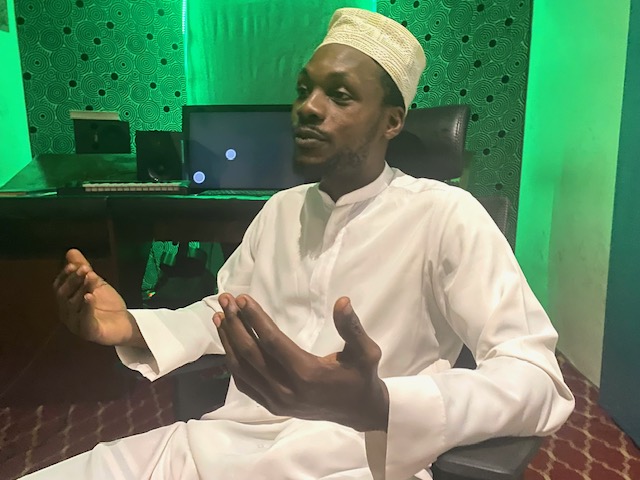
ZENJI BOI, OWNER OF STONE TOWN RECORDS. (PHOTO BY LAMONT JONES JR.)
At the age of 5, Zenji Boi says, he fell in love with Hip-Hop. Zenji is a slang term for Zanzibar, and the idea of community pushed him to start Stone Town Records in 2018. He sold cocktails and hosted events to raise seed money to open the studio, which is open around the clock. “We wanted to start a community studio,” says Zenji Boi. “First was a vision to help other musicians, to help local artists, and to make a unique sound. It’s about community.”
Community was also on the mind of Rico Single, who was born Rashid Amin Abdalla and started Island Records after a solo career that began in 2006 when his four-member group disbanded. “I saw (that) if I want to do better and want to go far, I must own my studio to make something good for my ideas. I try to help my friends record and to support other artists.”
Zenji Boi, 31, and Rico Single, 38, say they have fresh stories to tell. Not only do they write, rap and record from their personal experiences, they do so within the wider cultural context of a region that’s more than 99 percent Muslim and a native language of Swahili infused by diverse dialects and musical traditions.
Their lyrics and musicality, some observers say, represent new artistic expressions coming out of Africa from a Hip-Hop culture not saddled with the yoke of Western mainstream commercialism. What some American Hip-Hop scholars, ethnomusicologists, aficionados and artists have witnessed in Africa is reminiscent of Hip-Hop’s infancy, and they say these new stories are possible because the focus on community and authenticity honors Hip-Hop’s origins. That commitment, along with a desire to preserve historical African musical traditions, could be the genre’s lifeline as a new generation of rappers emerges on the continent and worldwide.
“There’s something different about African Hip-Hop artists,” says Fete Jen, an international arts culture connector, producer and founder of The Lounge, a platform in Tanzania that showcases creatives, specifically Hip-Hop artists. Inspired by the Lyricist Lounge in New York City, Fete Jen established The Lounge in 2014, working with local club owners to provide a venue for up-and-coming Hip-Hop artists to hone their skills on a stage in front of an audience.
Witnessing the talent firsthand, Fete Jen, who hails from Queens, New York, says there’s a hope in African Hip-Hop.
“The mind, the way they think on the continent, is so different – more enterprising,” Fete Jen says. “A lot of it is conscious rap. They talk about the culture and preserving the culture and celebrating themselves through music. I see it evolving and being deeper despite some of the trap music and other stuff, but there are enough (emcees) who are keeping it real.”
Authenticity is the only legitimate space within Hip-Hop, Zenji Boi contends, because Hip-Hop is about “real things around you – the real lifestyle you survive and live.”

RICO SINGLE IS THE FOUNDER AND CEO OF ISLAND RECORDS, IN ZANZIBAR. (PHOTO BY LAMONT JONES JR.)
Rico Single, whose earliest rap influences include DMX, Sean “Diddy” Combs and Tupac Shakur, says authenticity guides his music-making. “I feel good because Hip-Hop music is real music. They do everything. They make a revolution in the country, in the people. When you make Hip-Hop music, you don’t make fake music. Hip-Hop is the real thing. Hip-Hop is life.”
This same sense of community motivates both men to persevere in the Hip-Hop game, despite the chronically tough economic and technological challenges of operating in a rural region of a country less than one-fifth the population of the U.S. and with a GDP of less than one-fourth of 1 percent of the U.S. They’re optimistic about the possibilities and prepared themselves for the creative and business sides of Hip-Hop music.
Rico Single, who earned a certificate in music production at the Tasuba College of Art in Bagamoyo, Tanzania, established Island Records in 2013. He regularly raps at cultural and social events and has performed at the African Music Festival. Accolades are prominent on the wall of his recording studio, such as an award from the U.S. Embassy in 2015 for “Song for Peace” and a Zanzibar Music Award for “Best Male Musician of the Year.”
Zenji Boi, who plays violin and the oud, a Middle Eastern guitar-type instrument, says part of his vision is to help artists create a unique sound. When he’s not helping rappers lay down vocal tracks, he’s developing singers, musicians, emcees and deejays, including a few women. He urges them all to get some formal music education at Countries Music Academy in Stone Town, where he attended and learned theory about African, Arabic and Western musical traditions.
“This is not the ending,” he tells vocal artists when they record. “This is the beginning.”
Along with independent producers like Rico Single and Zenji Boi, African Hip-Hop is largely financed by nonprofit and nongovernmental organizations. NGOs have been the main source of funding for Hip-Hop communities in many countries outside the U.S., especially Africa, says Hip-Hop scholar Seth Markle, an associate professor of history and international studies and director of international studies at Trinity College in Connecticut.
Even graffiti artists, which Markle describes as one of the five elements of Hip-Hop, get support from NGOs in Tanzania, he notes.
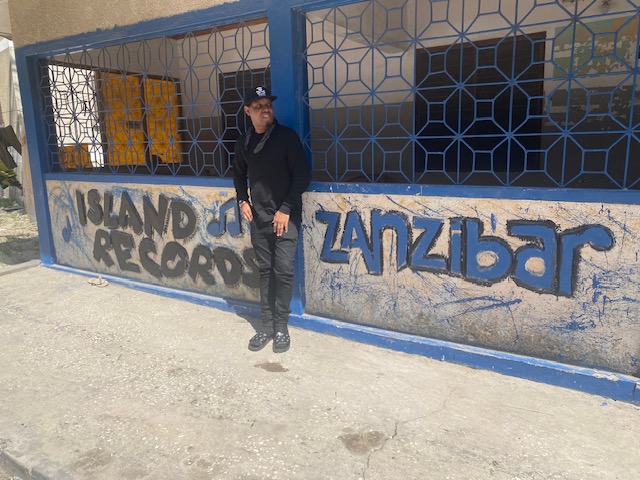
Hip-Hop Elements Embraced Globally
From the U.S. and Africa to Asia and Latin America, there are diverse communities within the large global Hip-Hop community, Markle notes, “and that’s what makes it so enriching.”
Rap is everywhere, and it’s often conflated with Hip-Hop when it’s actually just one component of Hip-Hop in a five-part framework that Markle says includes rap/emceeing, knowledge-sharing, deejaying/producing, graffiti and break dancing. Many Hip-Hop communities around the world have all five. Markle says Hip-Hop’s impact is indisputable when one considers that graffiti has been embraced in many countries as “a legitimate art form” and break dancing is poised to become a competitive category in the Olympics.
“You’re seeing a lot of advancement with the culture,” Markle says.
African Hip-Hop scholar Msia Kibona Clark, an associate professor of African cultural and feminist studies at Howard University, says all elements of Hip-Hop are embraced in Africa similarly to the U.S.
“The breakdancing scene in Uganda is huge,” says Clark, who was born in Tanzania, moved to the U.S. when she was 5 and grew up in Ohio. “You bring a bunch of break dancers from Uganda with break dancers from New York, you don’t need any translators. They have their own language. They share a flow and vibe and energy that comes off in the break dancing, graffiti, emceeing and deejaying. It does not need translation.”
Clark first witnessed the immersion of Hip-Hop culture in Africa as a college student in the 1990s, when she studied abroad in Tanzania. The Hip-Hop that she and classmates listened to attracted young Tanzanians, who hung out and enjoyed the music with them in their dorms and houses.
“I was surprised by the connection of Hip-Hop in Tanzania the first time there around ’96-’97,” Clark says. “This was after Tupac died. Everybody wanted to talk about Tupac. The biggest question was, ‘Is he still alive?’ ‘We think he’s still alive.’ We would have conversations and … the vibe was nice because we were able to connect through the bond of Hip-Hop.”
When Fete Jen studied abroad in Zimbabwe in the fall of 1993, she was shocked to hear American Hip-Hop music playing in clubs and to hear Zimbabwean rappers.
“It was amazing to hear our music in their clubs and on their radio,” Fete Jen says. “That really hit home that our music is really global, especially Hip-Hop.”
“Hip-Hop was all over the radio stations” in South Africa, Fete Jen later discovered in the late ‘90s. “South Africa had a very vibrant Hip-Hop community and graffiti scene. It was great to be there because they embraced the culture.”
That affinity remains, Clark says, noting that South Africa’s diverse Hip-Hop scene – including its hub in Cape Town – embraces artists ranging from queer to gangster rappers. Senegal and Ghana also have huge Hip-Hop scenes, she says, with Senegal and Nigeria hosting Hip-Hop festivals that have attracted aficionados from around the world.
“I think one of the reasons the youth embraced Hip-Hop so quickly is because they saw themselves in it,” Clark says. “They connected to the songs’ messages. The same issues in the South Bronx – overcrowded, poverty-stricken, police brutality – all those things, the education system … kind of struck a chord with people.”
Africans who have been in the music game understand the connectiveness of people of color much more than the younger generation of rappers, Clark observes. “The younger ones are not really politically aware of the political significance, but the older ones – they understand racism. Hip-Hop is a culture that brings people of African descent together, speaking in that same language.”
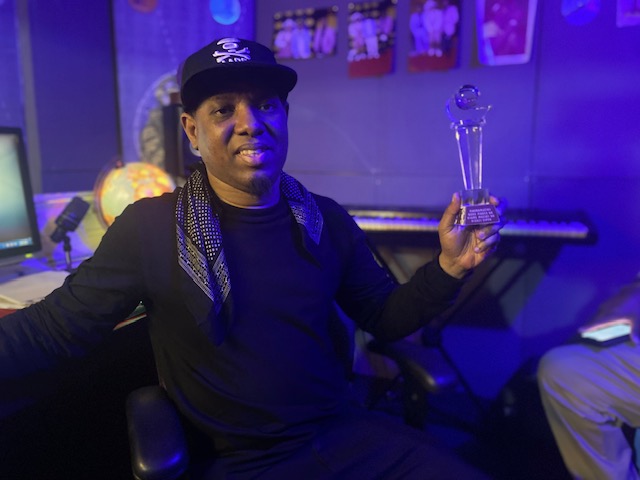
Pan-Africanism and the Diaspora
Hip-Hop illustrates how the U.S. and Africa have influenced each other and the rest of the African diaspora, some say.
“The political message of pan-African liberation is common ground and a source of identification,” Markle says. He cites Mbuya, the founder of Hip-Hop graffiti in Tanzania, who consumed a lot of political Hip-Hop from the U.S. and learned of the Black liberation struggle in the U.S. from Hip-Hop artists such as KRS-One and Wu Tang Clan. Mbuya self-identified as a pan-Africanist above a Hip-Hop artist.
African people are “looking for ways to communicate in the diaspora,” Markle says. That has meant African Hip-Hop artists incorporating more English in their rap, he says, adding that the genre is a vehicle for messaging ideas around racial solidarity. Africans and Black Americans “hold special places in each other’s imaginations,” he says.
Patrick Rivers, an ethnomusicologist and associate professor in the music department at the University of New Haven in Connecticut, says Hip-Hop universally “speaks to the oppressed, the postcolonial societies around the world. Hip-Hop speaks to more than sounds. It’s a connection.”
But for Eric Charry, another ethnomusicologist and professor of music at Wesleyan University, the pan-African connection appears to be more “on a nation-to-nation level.” Like many Hip-Hop scholars, he says Hip-Hop is authentic only as it emerges from the realities and experiences of a performer, and that can’t be divorced from their geography and specific culture.
For example, Senegalese rappers have a Senegalese audience and address issues in that country, which is also the norm in Tanzania, Jamaica, France and everywhere else, Charry says. However, some Hip-Hop artists “have a broader vision,” like Awadi from Senegal, and gaining a wider audience and appeal typically means that they must learn to rap in English or another common non-native language such as Spanish.
“That’s the paradox,” Charry says.
When Fete Jen considers African Hip-Hop artists in the context of the African diaspora, she thinks about U.S. Hip-Hop artists. She wonders if African American Hip-Hop artists know the impact their music has in Africa, and if they did, would they help African Hip-Hop artists transcend to a bigger stage. “I hope they can understand and realize the power they have on the continent. Do they realize who is listening to their music over here? Do they know how influential they are to the youth?”
Power, Money and Respect
Tupac, Jay-Z and 50 Cent were among rappers who inspired Zenji Boi, but it was Nas who spoke to him deeply. He says Nas’ vibe, style, flow and lifestyle attracted him to the Crown Heights rapper. For Rico Single, who banged to Tupac, Biggie and Jay-Z, it was Yonkers rapper DMX who most inspired his pursuit of rap.
Both Zenji Boi and Rico Single dream of cracking the U.S. market and collaborating with some of its Hip-Hop legends. However, for African Hip-Hop artists, the road to that destination is a difficult one, many experts say. One reason is the emergence of Afrobeats, a fusion of Hip-Hop and reggae, which Clark says has hindered African Hip-Hop artists trying to break into the American Hip-Hop scene. Afrobeats originated in West African cultures and, she notes, is sometimes confused with African Hip-Hop.
Yet, a few African Hip-Hop artists have seen some success in the American market. Clark points to Ghanaian rapper Sarkodi, and Sampa The Great, a Zambian rapper who performed at the music festival Coachella this year and has collaborated with artists such as Joey Bada$$. But generally, she observes, being a non-American artist makes it difficult to breaking into the U.S. market no matter the music genre, and African artists who are international tend to have gone the way of Europe and Asia.
As a non-American, a major barrier for African rappers is the language, Clark says. “What language is an artist going to rap in? Artists attempt to switch (languages) and when they do, there’s a noticeable drop in skills. So those types of questions are coming up.”
Somewhat ironically, the lyrical internal structure of the Ki Swahili language used in raps by Tanzanian artists “lends itself naturally and easily to rhyming,” says Markle. “It’s the perfect language for rap.”
As a result of the barriers to the U.S. market, there are a lot of working-class rappers in Africa, Fete Jen says. They work their 9-to-5 jobs while doing what they can to get their music played on the radio. That struggle, she says, sparks innovation.
“A lot of these independent artists are doing it on their own, and they are making it somehow,” she says. “’I think because they are diversifying themselves. They are being more entrepreneurial and enterprising and figuring out a way to make it independently here.”
More investment in African Hip-Hop and its artists is needed, says Rico Single, whose recent to-do list included raising the last half of $3,000 needed to make a new music video. Beyond his videos and festival performances, he promotes his music through play on local radio stations, social media platforms like Instagram and TikTok, and sales on digital platforms such as Spotify, Amazon, Boom Play and Apple Music. There are no such digital outlets in Zanzibar.
Rico Single also wants to enhance his equipment and software processes to take his music production to the next level. Financial and other investments are needed, he adds, “to save the talent from the street.”
Zenji Boi’s music is also available across multiple digital platforms, including iTunes and Apple Music. He sees a bond between Zanzibarian and U.S. Hip-Hop and has done three collaborations with American rappers. One is a woman, Akua Naru, whom he met when she visited Zanzibar to perform. Another is a New York rapper, (Hosanna) Reallionaire Jream. The third came to Zanzibar to find his roots in hopes of fusing African and American music.
Taking a brief break from his studio session with Brain, Zenji Boi says he’s among Hip-Hop artists who want to change the music and the less-than-wholesome mentality in some Hip-Hop, especially some of what comes from the U.S.
“It’s about the cultural environment, but not the same topics over and over,” he says. “It’s not just gangs. … There are more stories we can talk about in Hip-Hop.”
Across town, Rico Single spits some lyrics into a sound booth mike, bobbing his head as if in agreement.
(Editor’s note: Anthony Todd Carlisle, Ph.D., is an associate professor in the Department of English, Philosophy and Modern Languages at Pennsylvania Western University, author of “The Souls of Clayhatchee: A Southern Tale” and a former city hall reporter for the New Pittsburgh Courier. LaMont Jones, Ed.D., is managing editor for education at U.S. News & World Report, has written articles for the Courier about color bias in Cuba and New York Fashion Week, and is the author of two books.)
